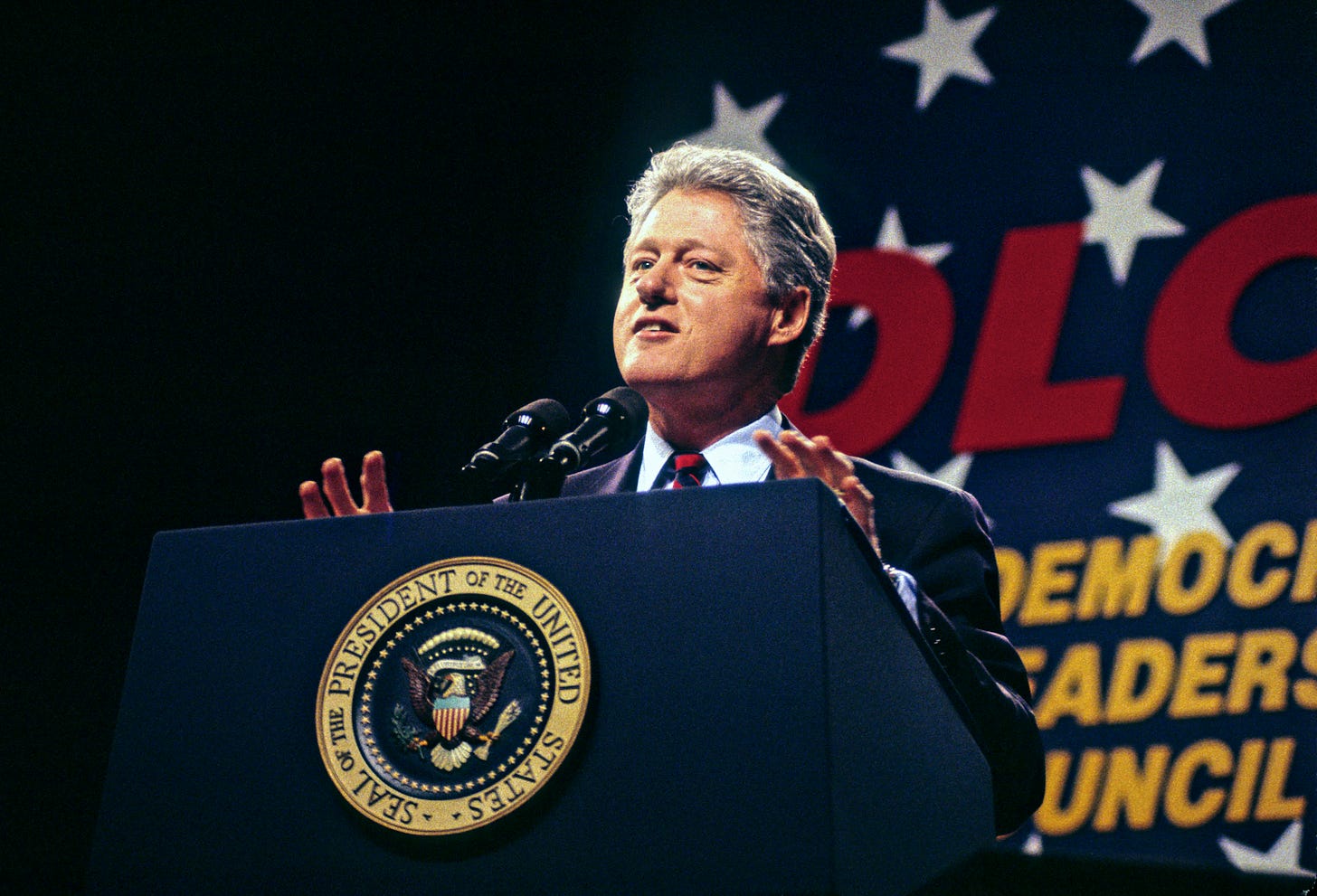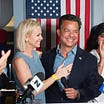Bubba Has the Answers for Dems in Despair
If the party wants to regain power, it should look back to the message from Bill Clinton.

“Too many of the people that used to vote for us, the very burdened middle class we’re talking about, have not trusted us in national elections to defend our national interests abroad, to put their values into our social policy at home, or to take their tax money and spend it with discipline. We’ve got to turn these perceptions around or we can’t continue as a national party.”
THESE WORDS SOUND LIKE THEY could be ripped from a Democratic forensic after the 2024 election. But they are three decades old, spoken by then-Arkansas Governor Bill Clinton at a 1991 meeting of the Democratic Leadership Council, which had been founded six years earlier to recenter the Democrats after three successive presidential losses of more than forty states.
The challenges the Democratic party faces today are not as dire. The 2024 loss was far from a landslide, with Donald Trump winning with less than 50 percent of the vote. It was just the second time since 1991 that Democrats have lost the popular vote.
But the continuity between Clinton’s critique and the damage the Democratic brand faces today is clear and stark. It’s evidence of how deep negative perceptions of the far-left run in the modern American psyche and why it’s so difficult to ditch them even three decades later.
The problem and the solution Clinton was articulating then—and which is needed now—are directly related to the middle class. This goes beyond the famous Clinton-James Carville formulation “It’s the economy, stupid,” which was validated once again in 2024 when voters turned against Joe Biden and Kamala Harris over inflation and affordability frustrations. It’s about reconnecting with middle-class values and not getting baited to engage in extreme culture-war fights.
Democrats need to get the big things right or the small things won’t matter—and that means being strong not just on economic security but also on national security and public safety.
In the wake of November’s election, there’s been a move among some Democrats to reconstitute the Democratic Leadership Council as a force to ensure the party is seen as being strong in the center of the political spectrum and can win over crucial independent voters. It’s been the subject of post-election conversations between frustrated candidates, activists, and donors. I personally called for a revival last spring during my congressional campaign in an interview with Ruy Teixeira of the Liberal Patriot podcast. The founder of the original DLC, Al From, even wrote a piece for The Bulwark outlining five key principles that made the group a success. He called for those same principles to be kept front and center if there’s an effort to reconstitute the DLC in some form going forward.
From told me that he’s been receiving calls to revive the organization. “I’ve had a number of conversations with Democrats who would like to see a new DLC style effort,” he said. “Whether it actually happens will depend on getting a core group of current elected officials who are willing to drive it forward—and leaders from a rising generation of governors would be a good place to start.”
Of course, the issues the United States faces now are different than those of three decades ago. The host of policies advocated back then by the DLC—and sometimes derided by its critics as “neoliberal”—don’t cut and paste to today’s challenges. In particular, the bet that free trade agreements with China would be met with rules-playing reciprocity and lead toward liberalization didn’t pay off. Other policies, like welfare reform and earned income tax credits proved to be successful while deficits turned to surpluses for the first and last time in our modern history.
But the values and strategies articulated by Bill Clinton in that 1991 speech still resonate. It was the first time that he articulated what would become his famous mantra: Opportunity, Responsibility, and Community. Those remain the right guiding lights. Here is the full Clintonian articulation:
We’ve got to have a message that touches everybody, that makes sense to everybody, that goes beyond the stale orthodoxies of left and right, one that resonates with the real concerns of ordinary Americans with their hopes and their fears . . . to give the people a new choice rooted in old values, a new choice that is simple: that offers opportunity, demands responsibility, gives citizens more say, provides them responsive government, all because we recognize that we are a community, we’re all in this together, and we’re going up or down together.
Democrats need to be the party that advances equal opportunity in a diverse liberal democracy. That means incentivizing economic investment to achieve broad-based growth, harnessing market forces to lower the cost of living, and improving the quality of life. It means supporting small businesses by cutting red tape and reducing taxes, reshoring essential manufacturing, expanding energy innovation, and presenting an optimistic vision of the future. It does not mean confusing equality of opportunity with equality of outcomes, which is inconsistent with liberty, fairness, and reality.
RESPONSIBILITY IS A WORD THAT makes some folks on the left uncomfortable. They’d much rather talk about rights than responsibilities. But being a citizen of a democratic republic requires embracing responsibilities as well as rights. Clinton knew this in 1992. Barack Obama knew this in 2008—his first inaugural address called for a “new era of responsibility.”
Responsibility demands accountability. That means being tough on crime as well as the causes of crime, to use a Tony Blair formulation. It means connecting welfare-to-work requirements for the able-bodied while expanding child tax credits for working families struggling to stay above the poverty line.
Democrats were not strong enough on the border at the outset of the Biden administration, enabling a migrant crisis that came to be seen as evidence of cultural chaos and civic decline. This coincided with the rise of homeless encampments that too many Democratic elected officials seemed unable or unwilling to confront. In addition, there were well-intentioned bail-reform laws that had the consequence of effectively decriminalizing low-level crimes like shoplifting under a thousand dollars. Even in California, a ballot initiative designed to crack down on low-level crime and recriminalize drug offenses passed by a 2-to-1 margin in 2024. This was a broad bipartisan rejection of civic disorder.
The message was clear: Borders need to be enforced, crime needs to be punished, and quality-of-life policing needs to be a mainstay of any sane urban policy.
But it’s the third word—community—that might be the most important and the most ignored over the past few decades. In our fragmented, isolated, digital lives there’s a deep desire for a sense of community. Communities thrive when there are high levels of civic trust. Today, civic trust is strained to the breaking point.
Ironically, the promise of community is what drives some people into the arms of tribal politics. But the enforcement mechanisms of tribal politics often fuel a divisive self-righteousness. On the left, this has led to association with a censorious cancel culture that makes folks feel like they’re constantly in danger of being sent to HR. A welcoming focus on what unites us, not what divides us, helped by a healthy sense of humor, should be a hallmark of Democratic politics.
Democrats can help rebuild our sense of community by reclaiming the center in our culture-war debates. This could be advanced by an expanded vision of national service in exchange for canceling college debt, social media reforms like the Kids Online Safety Act, and civics education. It means reclaiming what Hakeem Jeffries has called “The Four F’s”—freedom, the flag, faith, and fairness. Democrats need to celebrate patriotism as a positive good. They need to not only praise people of faith but elevate liberal expressions of faith, from the examples of MLK and Rabbi Heschel to the social gospel.
A new Democratic Leadership Council would focus on rebuilding the middle of our politics and the middle of our economy, while building on the legacy of an established brand. It would ensure the Democrats address the concerns of both business and labor. It would push for scaling back overregulation to get America building housing and infrastructure again. To Democrats who kick back at the idea of cutting regulations, I’d remind them of Al Gore’s successful “Reinventing Government” effort while noting that the increased speed of implementing initiatives like Biden’s infrastructure and clean energy bills would help show people that government can be responsive to their needs rather than being perpetually caught up in red tape. Its key economic barometer would be strengthening the middle class.
A new DLC would look to leadership from mayors and governors, recruit red-state and rural Democrats, and actively work to build a coalition between the center left and the center right in an era of Trumpian extremism, incompetence, and corruption.
Perhaps most crucially, a new DLC would stand up against illiberalism consistently, whether it comes from the far right or the far left. It would push back against divisive group identity politics and insist on treating people as individuals first, while ensuring equality under the law. A revived DLC would ensure that Democrats are policing our own extremes and standing strong as a party of reform rather than defaulting to a party that defends an uninspiring status quo.
A revived DLC is not a nostalgic exercise or a capitulation to the donor class. Instead, it is an urgent practical electoral need to deal with the very real brand deficits Democrats face. It is a rebellious project because it would seek to strengthen the center in a time of dangerous polarization with an independent structure that can act as a counterweight to the more organized efforts of the left. Ultimately, any party needs both wings to fly. But a strong and confident vital center would help realign our politics and ultimately reunite our nation.
Bill Clinton understood this. Bill Clinton won.





